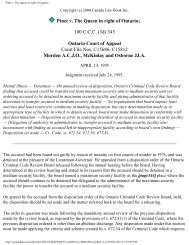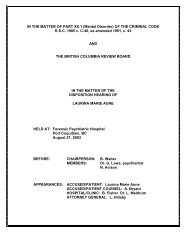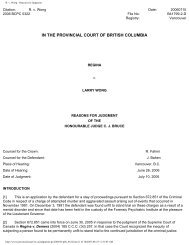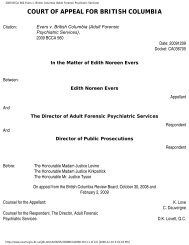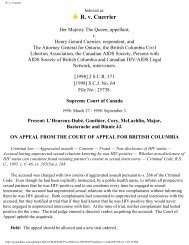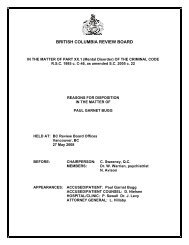R. v. CONWAY - British Columbia Review Board
R. v. CONWAY - British Columbia Review Board
R. v. CONWAY - British Columbia Review Board
You also want an ePaper? Increase the reach of your titles
YUMPU automatically turns print PDFs into web optimized ePapers that Google loves.
[29] Foreshadowing the debate that is before us in this case, Iacobucci J. in dissent,<br />
expressed the view that the arbitrator was neither a “court” nor of “competent jurisdiction” for the<br />
purpose of granting Charter remedies under s. 24(1). In his view, Weber was entitled to seek labour<br />
remedies from the arbitrator, but not those under the Charter.<br />
[30] The Weber “exclusive jurisdiction model” enunciated by McLachlin J., which<br />
directed that an administrative tribunal should decide all matters whose essential character falls<br />
within the tribunal’s specialized statutory jurisdiction, is now a well-established principle of<br />
administrative law (Regina Police Assn. Inc. v. Regina (City) <strong>Board</strong> of Police Commissioners, 2000<br />
SCC 14, [2000] 1 S.C.R. 360; Québec (Commission des droits de la personne et des droits de la<br />
jeunesse) v. Québec (Attorney General), 2004 SCC 39, [2004] 2 S.C.R. 185; Québec (Human Rights<br />
Tribunal); Vaughan v. Canada, 2005 SCC 11, [2005] 1 S.C.R. 146; Okwuobi; Andrew K. Lokan and<br />
Christopher M. Dassios, Constitutional Litigation in Canada (2006), at p. 4-15).<br />
[31] The next year, this Court decided Mooring. The issue was whether the National<br />
Parole <strong>Board</strong> was a court of competent jurisdiction for the purpose of excluding evidence under s.<br />
24(2) of the Charter. Sopinka J., writing for the majority, considered only the third step of the Mills<br />
test since he found it to be determinative. In his view, it followed from the Parole <strong>Board</strong>’s structure<br />
and function, as well as the language of its enabling statute, that the <strong>Board</strong> could not exclude<br />
evidence under s. 24(2) of the Charter. Pursuant to the Corrections and Conditional Release Act,<br />
S.C. 1992, c. 20, the <strong>Board</strong> was not bound by the traditional rules of evidence and was obliged to<br />
consider all available, relevant information when rendering its decisions. The ability to exclude<br />
evidence would have been, in Sopinka J.’s view, inconsistent with the intent and specific provisions



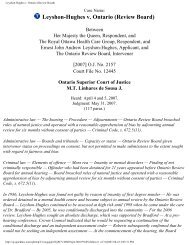
![LaFortune [LaFortunate] (Re) - British Columbia Review Board](https://img.yumpu.com/42779845/1/190x245/lafortune-lafortunate-re-british-columbia-review-board.jpg?quality=85)
